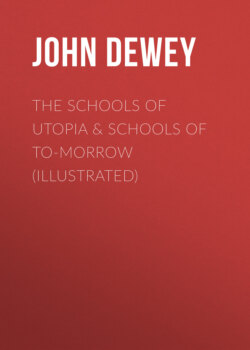The Schools of Utopia & Schools of To-morrow (Illustrated)

Реклама. ООО «ЛитРес», ИНН: 7719571260.
Оглавление
Джон Дьюи. The Schools of Utopia & Schools of To-morrow (Illustrated)
The Schools of Utopia & Schools of Tomorrow (Illustrated)
Reading suggestions
Table of Contents
Schools Of To-morrow
Preface
Chapter I. Education As Natural Development
Chapter II. An Experiment In Education As Natural Development
Chapter III. Four Factors In Natural Growth
Chapter IV. The Reorganization Of The Curriculum
Chapter V. Play
Chapter VI. Freedom And Individuality
Chapter VII. The Relation Of The School To The Community
Chapter VIII. The School As A Social Settlement
Chapter IX. Industry And Educational Readjustment
Chapter X. Education Through Industry
Chapter XI. Democracy And Education
The Schools of Utopia
Parenthood Required
Learning by Association
Emphasis on Development
The Inevitability of Learning
Relation to Economic Ideas
Attainments vs. Capacities
Отрывок из книги
John Dewey
The Schools of Utopia
.....
The passage shows how far Rousseau was from considering bodily development as a complete end in itself. It also indicates how far ahead he was of the psychology of his own day in his conception of the relation of the senses to knowledge. The current idea (and one that prevails too much even in our own time) was that the senses were a sort of gateway and avenue through which impressions traveled and then built up knowledge pictures of the world. Rousseau saw that they are a part of the apparatus of action by which we adjust ourselves to our environment, and that instead of being passive receptacles they are directly connected with motor activities—with the use of hands and legs. In this respect he was more advanced than some of his successors who emphasized the importance of sense contact with objects, for the latter thought of the senses simply as purveyors of information about objects instead of instruments of the necessary adjustments of human beings to the world around them.
Consequently, while he makes much of the senses and suggests many games for cultivating them, he never makes the mere training of the senses an object on its own account. “It is not enough,” he says, “to use the senses in order to train them; we must learn to judge by their means—we cannot really see, hear, or touch except as we have learned. A merely mechanical use of the senses may strengthen the body without improving the judgment. It is all very well to swim, run, jump, whip a top, throw stones. But we have eyes and ears as well as arms and legs, and these organs are necessary for learning the use of the rest. Do not, then, merely exercise strength, but exercise the senses as the powers by which strength is guided. Make the best use of every one of them, and check the results of one by another. Measure, count, weigh, compare. Do not use force till you have estimated the resistance; let estimation of the effect always precede application of the means. Get the child interested in avoiding superfluous and insufficient efforts. If you train him to calculate the consequences of what he does and then to correct the errors of his prevision by experience, the more he does, the wiser he will become.”
.....